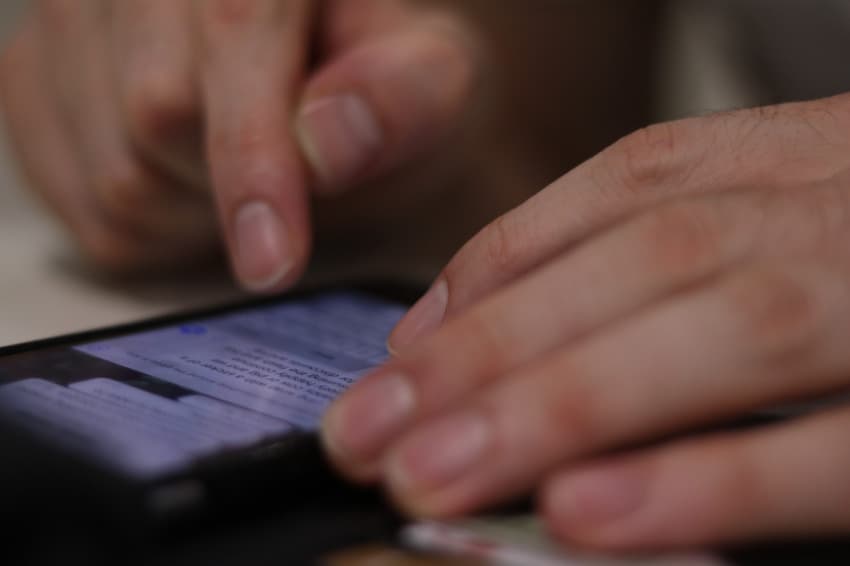Denmark issues ban on ministers and officials from deleting texts

The Ministry of Justice has published new temporary rules for storage of text messages at ministries following controversy by an official inquiry.
The recently-published report by the Mink Commission, appointed to scrutinise the government’s 2020 decision to cull fur farm mink – later found to have been made without legal basis – criticised officials for deleting SMS messages that would have provided important context in the inquiry.
During the inquiry, the commission found that Prime Minister Mette Frederiksen and several other officials had their mobile telephones set to automatically delete texts. That resulted in the commission being unable to see them.
The justice ministry has now set out new interim rules for storage of SMS communications, it said in a statement.
READ ALSO: What did Danish mink inquiry conclude and what happens next?
The new rules and guidelines are intended to ensure that ministries keep records of work-related text messages on devices used by ministers, special advisors and heads of department.
The texts must also be retained if officials switch to a new device or leave their positions.
Interim rules have been put in place because of “the timescale for clarification of the technical options for central and user-independent storage of SMS messages”, which will eventually be put in place to “ensure uniform practice”, the ministry said.
A uniform process for storing texts sent in an official capacity “takes time to develop”, Justice Minister Mattias Tesfaye said in the statement.
“We don’t have the solution [in place] today. That’s why it’s good that we now have temporary guidelines that we can use for now,” he said.
The Mink Commission last week published a 4,500-page report in which it found fault with Frederiksen, who, it said, made “grossly misleading” statements about the legal basis of the mink cull at a November 2020 press conference.
It was not the duty of the commission to make a legal assessment of whether Frederiksen or other ministers and officials acted intentionally or recklessly.
Potential consequences for Frederiksen could have resulted in an independent legal assessment of the scandal, which could in turn have led to the appointment of a special impeachment court, a rare occurrence in Danish politics but used as recently as last year.
This does not now appear to be on the cards after the centre-left Social Liberal (Radikale Venstre) party said it did not back an independent legal assessment, meaning this move would not have the parliamentary majority it would need to go ahead.
The Social Liberals have, however, threatened to forward a motion of no confidence in the government if Frederiksen does not call a snap general election by October 4th.
Comments
See Also
The recently-published report by the Mink Commission, appointed to scrutinise the government’s 2020 decision to cull fur farm mink – later found to have been made without legal basis – criticised officials for deleting SMS messages that would have provided important context in the inquiry.
During the inquiry, the commission found that Prime Minister Mette Frederiksen and several other officials had their mobile telephones set to automatically delete texts. That resulted in the commission being unable to see them.
The justice ministry has now set out new interim rules for storage of SMS communications, it said in a statement.
READ ALSO: What did Danish mink inquiry conclude and what happens next?
The new rules and guidelines are intended to ensure that ministries keep records of work-related text messages on devices used by ministers, special advisors and heads of department.
The texts must also be retained if officials switch to a new device or leave their positions.
Interim rules have been put in place because of “the timescale for clarification of the technical options for central and user-independent storage of SMS messages”, which will eventually be put in place to “ensure uniform practice”, the ministry said.
A uniform process for storing texts sent in an official capacity “takes time to develop”, Justice Minister Mattias Tesfaye said in the statement.
“We don’t have the solution [in place] today. That’s why it’s good that we now have temporary guidelines that we can use for now,” he said.
The Mink Commission last week published a 4,500-page report in which it found fault with Frederiksen, who, it said, made “grossly misleading” statements about the legal basis of the mink cull at a November 2020 press conference.
It was not the duty of the commission to make a legal assessment of whether Frederiksen or other ministers and officials acted intentionally or recklessly.
Potential consequences for Frederiksen could have resulted in an independent legal assessment of the scandal, which could in turn have led to the appointment of a special impeachment court, a rare occurrence in Danish politics but used as recently as last year.
This does not now appear to be on the cards after the centre-left Social Liberal (Radikale Venstre) party said it did not back an independent legal assessment, meaning this move would not have the parliamentary majority it would need to go ahead.
The Social Liberals have, however, threatened to forward a motion of no confidence in the government if Frederiksen does not call a snap general election by October 4th.
Join the conversation in our comments section below. Share your own views and experience and if you have a question or suggestion for our journalists then email us at [email protected].
Please keep comments civil, constructive and on topic – and make sure to read our terms of use before getting involved.
Please log in here to leave a comment.